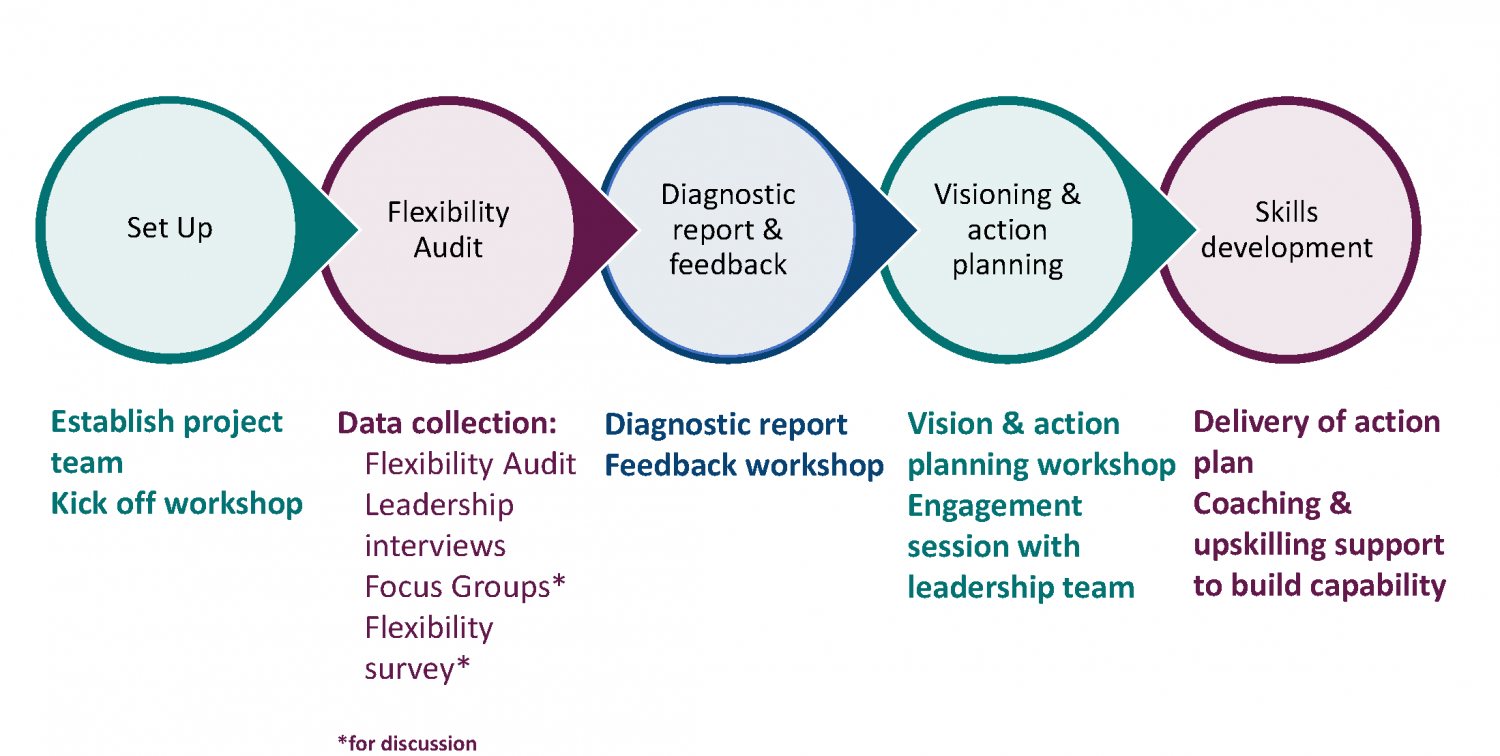

Timewise’s fourth report for the Scottish Government finds there has been negligible increase in the proportion of jobs advertised with options to work flexibly. More than 7 in 10 jobs are still off limits for flexible workers.
Flexible hiring – advertising job vacancies as flexible from day one – is a key building block for fair access to work. It is a lifeline for people who need to work flexibly; a tool for employers to attract more talent; and at a societal level, it can help tackle inequality.
Yet the latest Scottish Flexible Jobs Index finds that only 28% of advertised vacancies offer flexible working, barely any higher than the previous year (27%). This rate lags far behind both demand for flexibility and workplace practice – 8 in 10 Scottish people want to work flexibly, with 6 in 10 already doing so.
There are also several underlying concerns. Home-working (including hybrid) is the only form of flexibility that is increasing, while part-time arrangements (highly sought by people with caring commitments) show no growth at all. And potential inequalities between workers are exacerbated by wide discrepancies in access to flex at different salary levels, by occupation and by region.
Employers need to change their approach as a matter of urgency, especially in light of forthcoming legislation on the ‘day one right to request flexible working’. Our report contains recommendations for employers and policy makers on how best to adapt.
By Emma Stewart, Co-Founder

I’ve lost count over the last decade of the number of times I’ve written about how good flexible work is a social necessity. And while I’m delighted with how much more mainstream flexible working has become, there are some battles we still need to fight if we’re going to make our society a more equitable one.
We all know how devastating the impact of the current cost of living crisis is going to be, particularly for people on low incomes; you don’t need me to explain that to you. We also know that the economy is being held back by the fall in the number of people in the workforce, as Andy Haldane recently noted.
But what may have been forgotten is that the single thread that can pull these issues together, and make this current crisis more manageable for many people, is offering good quality part-time jobs.
We’ve recently produced a report, in partnership with the Joseph Rowntree Foundation, which explores this issue in more detail. We’ve also analysed the flexible jobs market in our latest Flexible Jobs Index. Together, these leave us in no doubt about the lack of good quality flexible jobs – and the potential impact that creating more of them could have:
So, creating more, better quality part-time and flexible jobs, and offering them at the point of hire, could open up opportunities for people in our priority groups (and others who also need flexibility to work) to access the workplace. It would also allow them to progress their careers, and boost their household incomes accordingly.
This would not only benefit the individuals concerned, and society as a whole, but would also help tackle the recruitment issues that so many employers are facing.
So why isn’t this happening? Well, as our report also highlights, employers don’t tend to be ideologically opposed to flexible working. But some clear barriers are holding them back, including inertia and a lack of motivation, a lack of understanding, and fear and a lack of trust.
Yet, as the IES recently reported, helping employees through the current crisis is the highest priority for employers right now. So given that flexible working is a key way to do so, they need to overcome these barriers – and they need supporting to do so.
The good news is that the government has now published its response to the consultation on the right to request flexible working, and confirmed that it will be bringing forward new regulations to give employees this right from their first day in a job. It’s likely that the regulations will find their way onto the statute book in Spring 2023, which means the new rules could be in force by as early as the autumn.
This important change is also accompanied by government support for wider measures, which will be brought forward via a private members bill, and include allowing employees to make two flexible working requests in a year, and requiring employers to respond more quickly.
However, although these are a hugely positive steps, they aren’t yet the gamechanger we need, as this day one right still puts the onus on the employee to ask. So, while we hope that this legislation will increase the number of employers advertising roles flexibly, we doubt it will fully deliver the change in hiring practices and job design that employees and our economy need.
To give the legislation its best chance of success, we also need the infrastructure in place that will support employers to make flexible jobs available from the point of hire, including:
Here at Timewise, we are already carrying out some of this work:
If you would like to find out more about what we’ve done, and what we have learned from it, please get in touch.
But we are just one organisation; and the task of fixing the jobs market, so that people who need to work flexibly can access well-paid, good quality jobs, is one that we can’t tackle alone. It’s my hope that the current labour supply crisis will be the catalyst that encourages policymakers and organisations to take this issue seriously, and that I won’t still be talking about this in a few years’ time. I can promise you that I won’t stop until it’s fixed.
Published December 2022
The UK is facing a labour market crisis with demand far outstripping the supply of candidates, and a cost of living crisis that is hitting hard, especially for low income households. Against this backdrop, Timewise set out to explore:
The jobs market remains broken for people who need to work flexibly, and a key barrier is employer resistance. This report seeks to improve understanding around the issues, with a view to encouraging more employers to engage with the idea of hiring flexibly, and realise the benefits of changing their hiring practices.
Published November 2022
By Nicola Smith, Director of Development and Innovation

There’s been much discussion in recent months about increasing numbers of older workers leaving the workplace. The ONS figures back this up, showing that over 200,000 people aged 50-65 have left the jobs market over the last two years. Commentators, including the Resolution Foundation and the Institute for Employment Studies, have also concluded that post-pandemic shifts in labour supply have largely been driven by falling numbers of people aged 50 and over looking for and available to work.
So it follows that a key way to fill the high number of vacant roles would be to encourage and support older workers to stay in their roles, or come back into the workforce. And the good news is, flexible working can help make this happen.
It’s worth noting that ‘over 50s’ is a very wide category. As a result the health status, caring responsibilities, skills and incomes are probably more varied within this group than those of people in any other commonly used age bracket.
And while it’s relatively well understood that flexible working can support those with ill health and disabilities to remain in or return to the workplace, that’s not the only factor. There are other reasons why members of this group are leaving employment – and for which flexible working can also be part of the solution.
Recent ONS analysis gives some particularly useful insight into the varied experiences of older workers who have left the jobs market since the pandemic begun. Findings include:
Crucially, the figures also show that, among those who would consider returning to work, a third said the most important factor was flexible hours. Good pay came second (at 23%), followed by being able to work from home (12%) and work that fits around caring responsibilities (10%), both of which are linked to flexibility.
Clearly, then, offering flexible working is a critical part of the answer to employers’ retention and hiring woes. By helping to overcome the medical, personal or financial reasons why older workers are leaving the workplace, it could encourage them to stay for longer, or encourage those who have already left to come back.
Our work with the Centre for Ageing Better set out how and why employers can use good flexible working to boost the retention of older workers. And when it comes to supporting them back in, the answer is clear: employers need to advertise flexible roles from the point of hire. In both cases, this means going through a job design process that explores when, where and in how much time the role can best be fulfilled.
Today’s data make an even more compelling case for why everyone needs to act – and is a pertinent reminder of the benefits that more, good flexible working at the point of hire could bring for business and workers alike. We know that many employers are already doing this well, and that many others recognise that they need to make the shift; if you need support with this, we’re here to help.
In the meantime, keep an eye out for our new Flexible Jobs Index, launching later this month, which will highlight how far we still have to go in terms of making flexible jobs available from day one. It will be published alongside a new study, undertaken in partnership with the IES and supported by the Joseph Rowntree Foundation, which explores the challenges employers face and the actions needed to widen access to good flexible roles.
Published November 2022
In 2020, we were commissioned by the Scottish Government to help improve access to fair flexible working for parents and carers, as part of their Tackling Child Poverty Delivery Plan. Having carried out a feasibility study, we concluded that we need to take a systemic approach, equipping intermediaries who were already working with job seekers and employers, so they were able to advise on flexible working.
The result was Fair Flexible Work for Scotland, a two-year programme through which we created a network of Change Agents from 70 intermediary organisations. We trained them up to offer the right support, as well as connecting them to a range of wider experts on flexible working, including the Scotland-based Flexibility Works.
This report sets out how we carried out this work, and shares the positive outcomes from the programme. It’s fair to say that it was a resounding success; highlights include 80% of participants saying they have a better understanding of how to influence employers to enable a fairer, more successful approach to hybrid working, and 76% strongly agreeing that “I am motivated to take action to ensure fairer access to flexible work by more people.” We will continue to monitor the impact of the support that the Change Agents are providing, and are currently exploring the potential of replicating this model elsewhere in the UK.
Published September 2022

Government of Jersey (GoJ) is a complex and multi-faceted organisation which employs around circa 7,000 employees. Their roles span all central government departments and the delivery of all key public services, including prison, uniformed services, police, education, health, and social care.
The challenge and opportunity
Prior to the Covid-19 pandemic, GoJ were already looking to develop a more systemic approach to flexible working, as a way to improve diversity (particularly gender diversity at senior levels) and to tackle recruitment and retention. The pandemic then acted as a catalyst for increasing flexibility within the organisation, and helped encourage leadership buy-in for making the change.
“Our staff survey responses provided a strong signal that the flexibility employees had experienced during the pandemic was something they wanted to retain and build upon. During the pandemic, many people had gone the extra mile and flexed how they work for the benefit of the organisation and the island. We were particularly conscious of how demotivating it would be for our workforce if we ignored their feedback and simply reverted to old ways of working.”
The Timewise Flex Positive Programme
We agreed with GoJ that our Flex Positive Programme would be the best route to developing a systemic approach to flexible working.
The programme includes an organisation-wide diagnostic to understand the status quo and identify opportunities to enhance flexibility, and workshops to support the development of an organisational vision for flex. These feed into the development of a flex action plan, which is followed by skills development workshops, focusing on job design and creating a culture of flexibility.

“The benchmarking / diagnostic process was really good for us, giving us an independent review of our working practices and helping us see what good looks like. Through the programme, Timewise provided us with a clear roadmap and introduced us to the concept of taking a team-based approach. It helped us to focus on what was important and create an action plan which didn’t seem overwhelming. Timewise bring a wealth of experience and understand what works – without their expertise and guidance it would have taken us a lot longer to make the change.”
Flexible working pilots
We also worked with GoJ to design and deliver flexible working pilots within four departments. These ran between September 2021 and January 2022, supported by monthly coaching clinics led by our team.
At the end of each pilot, we carried out evaluation surveys to gather feedback from participants, to understand their experiences of working flexibly and identify any areas in which they felt flexibility could be further enhanced.
“The pilots have generated learning which has moved the organisation further forward and encouraged others to consider and rethink their approach.”
Key learnings from the programme included:
Trust and an open mindset are critical to success. Start from a place of trust and empower people to balance their needs with the needs of their jobs / team / stakeholders and customers.
A consistent approach from line managers is critical. Upskill line managers across the organisation in flexible job design, managing flexible teams and building trust, to ensure a consistent approach.
“You have to get the managers on board and change their mindsets around flex – if you don’t do that it won’t work. Give them the skills and confidence to take it forward.”
Take a team-based approach. Develop flexible working on a whole-team level so that employees take collective responsibility for ensuring a fair approach. Seek feedback regularly and work together to find solutions to any challenges that may arise.
“We learnt how critical taking a team-based approach is – involve everyone and be open and transparent in discussions you have.”
Learn and evolve. Be willing to experiment; be creative and open-minded about the parameters for pilots, using job design methodology to explore what is possible for each role. Share the experiences of pilot departments with other teams to showcase what is possible, and help to build a culture of flexibility across the wider organisation.
“With pilots, you don’t necessarily get an outcome which will be right first time. It is an iterative process and provides vital learning which helps you evolve and become more creative.”
“We have created a momentum and there is no going back now! We have adopted a more organic approach to flex as an organisation, the conversation is happening now, and flex has become a leadership priority.”
GoJ now proactively promote all jobs as being open to flexibility, both internally and to potential applicants. They are implementing their flex action plan, have delivered training to managers, and developed toolkits and guidance. Flex is now firmly on the leadership agenda.
Through the pilots, they have been able to develop case studies and showcase what is possible to other teams (including flex in senior roles). And, using a team-based approach, they are now rolling out further pilots across other departments.
The feedback we received from pilot participants speaks for itself. On average:
The client’s view:
“I would highly recommend working with Timewise. They bring a breadth and depth of experience which was invaluable, but what I have valued above everything else has been their flexibility and support. They truly operated as a trusted partner and were always there for us, we never felt left to get on with it. They were as committed, passionate and connected to the outcome as we are.”
Published June 2022
By Emma Stewart, Development Director, Timewise

The government consultation into ‘Making flexible working the default’, launched in September 2021, was welcomed by individuals and groups across the spectrum. Unfortunately, however, the legislation that would have brought it to life has been postponed. The employment bill in which it would have been included did not appear in the 2022 Queen’s Speech, and at the time of writing, it’s not clear when time will be found for it.
Clearly, this is disappointing for all of us who have an interest in making workplaces fairer and more flexible. As Ann Francke, head of the CMI, noted in the Financial Times, “Many parts of the bill have risen to even greater prominence in the pandemic, making the rights to a modern workplace more important for marginalised groups such as women, and those from poorer backgrounds and ethnic minorities. This is exactly the sort of legislation we need to build back better and level up the UK.”
We’ll be watching with interest to see when this legislation is tabled, and will continue to make our views clear on why it’s so critical, not least through our membership of the Flexible Working Taskforce. In the meantime, here’s a reminder of the government’s proposals – and how we felt they could be improved.
The proposals outlined in the BEIS consultation were certainly a step in the right direction. Amongst the changes on the table was to giving employees the right to ask for a flexible role from the moment they join an organisation – rather than waiting 26 weeks, as is currently the case.
But as we stated in our formal response to the consultation, our view here at Timewise is that this doesn’t go far enough. Why? Because it still puts all the onus on the employee to ask.
Rightly or wrongly, many candidates still fear that bringing up the question of flexible working might damage their chances, and so may decide not to ask. And given that, according to the TUC, 1 in 3 flexible working requests are turned down, they’re right to be sceptical. Additionally, our recent candidate research showed that 2 in 5 people who are seeking to work flexibly simply won’t apply if the advert doesn’t mention it.
Yet unfortunately, even after the huge, pandemic-driven shift in attitudes to remote and hybrid working, only 1 in 4 jobs are currently advertised as flexible.This narrows the options to the point of near invisibility, particularly for those who can’t work without a degree of flexibility, whether for caring, health or other reasons. Without a clear steer from the employer, many candidates won’t risk making a request, in case the answer is no. And they’re even less likely to risk leaving the job they’re in without being confident that they can get similar flex in their next one.
Instead, then, we believe that the legislation should take things a step further. We think employers should be required to consider whether a job can be made flexible, and if they feel it can’t, to explain why not. And critically, if it can be done flexibly, they should be required to state the flexibility on offer up front in the recruitment process.
At the time the consultation was launched, the government stated that it wasn’t the right time to take this extra step, noting that: “A number of respondents to the July 2019 consultation also suggested that requiring an employer to say whether a job is open to flexible working in the advert would drive the wrong response from those we were most looking to influence – those employers not culturally ready would simply default to ‘no’.”
But the world has changed so dramatically since 2019 that this felt to us, and still feels, like an overcautious approach. Organisations of all shapes and sizes are getting to grips with flexible working; even the NHS, Europe’s biggest employer, with some of the most complex working patterns around, now expects employing organisations to “consider how they promote the right to request flexibility from day one and the availability of flexible working options.” To put it bluntly, if not now, when?
It’s important to say that we are not suggesting that the government should just bring in the requirement to consider whether a job can be made flexible, and leave employers to get on with it. We appreciate that not all employers are ready to take that step; we have also previously noted the risk of ‘flex-washing’; that is, just saying a job is flexible without considering it properly or designing it to work that way.
Instead, in our response to the consultation, we called on the government to provide a package of support for employers, to help them create and implement flexible jobs and behaviours, along with any new legislation. This would include training managers in how to design flexible jobs and manage flexible teams. And in some sectors, in which flexibility is more complex to achieve, it would involve supporting them to test and pilot different approaches.
If this support were available, employers would be able to get to a position where considering whether a job can be made flexible, and what options are the most suitable, happens before the recruitment process. Where hiring managers proactively think this through. And where doing so is seen as an opportunity to attract the best talent, rather than a problem to be solved.
Whereas without investing in this approach, any right to request flexible working from day 1 – or to be automatically entitled to it, as some have called for – will be hugely risky, as organisations won’t be equipped to navigate the process.
Of course, it’s not just a question of training and testing; culture and behaviours also have a huge part to play. We know that organisations who already do this well develop company cultures in which flexible working is a strategy, not a policy, and is championed and celebrated by leaders.
To be frank, they’d be daft not to; the current recruitment crisis is creating a battle for talent, in which employers who can demonstrate that they value their employees’ home lives as much as their work lives are likely to have the edge. So it really is in everyone’s interests to get the right behaviours in place.
If you’re on board with the concept, but not sure what steps to take, we can help; we offer a range of consultancy services, including training line managers in flexible job design and supporting leaders to develop a flexible vision, principles and culture. In the meantime, we’ll be waiting expectantly for these proposals to make it back into the government’s legislative programme.
Published May 2022
By Emma Stewart, Development Director, Timewise

These days, most employers have moved beyond the question ‘is flexible working beneficial?’ It’s generally accepted that yes, it is, for both businesses and their people. But many employers in frontline sectors are still prone to thinking ‘it just won’t work in a firm like ours’. To change their mindsets, two hurdles must be overcome: first, proving that flexible working is possible for frontline workers; and secondly, proving that there will be a commercial return on the implementation costs.
Timewise has already proved the first of these over the last 6 years, through our pilots with trailblazing organisations in retail, teaching, construction, the NHS and domiciliary social care. And now we have pretty much proved the second – launching a new report that demonstrates how soon the cost of investment in flexible working can be recouped through savings on sickness absence and replacement costs related to high staff churn. The answer is that so little change is needed, so quickly, that investing in flexible job design really does seem like a no brainer for any frontline business employing around 200+ staff.
Frontline workers have been completely left behind in the hybrid working revolution that has happened during the pandemic. Unable to work from home, they have had to carry on commuting, in roles that are often low-paid and physically and mentally challenging. Little wonder that many employers are concerned about the increasing disparities between their frontline and office staff, and are showing an interest in ways of levelling up.
While location-based flexibility has become the norm, time-based flexibility (which might take the form of flexible start and finish times, greater input into shift times, or part-time working), can go some way towards providing equity for those unable to work from home. Timewise’s pilots in the five aforementioned sectors have explored the viability of flexible hours of work, and evidenced that frontline workers really do value having a greater sense of autonomy over their working lives.
This is backed up in independent research by Understanding Society, which shows that job satisfaction improves significantly as the degree of control over working hours increases. And the same research also points to a link between job satisfaction and staff retention: three quarters of workers with the lowest satisfaction levels say they would like to leave their job within the next year.
Timewise has shown that it IS possible to fix the lack of flexibility for frontline workers – in the sectors where we ran pilots, we were able to find ways to design frontline jobs with different working patterns that met operational requirements, maintained client expectations, and improved workers’ work-life balance and well-being.
The organisations which took part in the pilots have witnessed the potential that flexibility has; but vast numbers of employers in frontline sectors still struggle to see it as a commercial priority. Currently, 95% of frontline workers are unable to formally work flexi-time. There’s a huge amount of potential to improve job satisfaction and retention rates.
Of course, getting flexible working right requires staff consultation, new job design that meets business and employee needs, trialing the changes, and then evaluating and rolling out. The investment of time and money can seem daunting, so Timewise decided to map out how the return on investment might look, to prove the effort is likely to pay dividends.
Working together with the Institute for Employment Studies, we undertook break-even analysis to determine what level of savings would be needed over what timeframe, to cover the level of investment in each of our pilot programmes with firms in the five frontline sectors (retail, teaching, construction, the NHS and domiciliary social care). The savings we considered were those made through reduced staff absences and staff churn, and the results showed that very modest reductions would recoup the costs in just a few years.
For example, in a construction firm of 200 employees, 68 will typically leave each year (based on the average industry retention rate) at a total cost of £204,000. The break-even analysis showed that all it takes is for 7.5 fewer staff to leave each year for the investment in flexible working to be recovered within 3 years.
The same size firm will typically lose £177,000 in sickness absence per year, based on the industry average. So, alternatively, it takes just 1 day less of sick leave per person per year to fully recover the cost of investing in flexible working over 3 years.
And that is before any wider benefits resulting from improved flexible working are taken into account, such as improved well-being, increased diversity, wider access to talent and improvements in performance.
Moreover, for larger firms which are embedding flexible working across their whole workforce, the gains would scale up dramatically. Based on the calculations above, we estimate that employers with over 1000 workers could each save over £1m PER YEAR if they invest in flexible working programmes.
Surely, given the state of the labour market for these sectors, and rising inequality between office and frontline workers, this is the moment for action. Employers, industry and government can no longer afford to ignore the cost of not investing in flexible working. There is now a commercial as well as social imperative to consider how we can extend the autonomy of office workers to their frontline colleagues.
When frontline workers are given access to more flexible work, their job satisfaction is likely to improve, and they are more likely to stay in their jobs. These five sectors all suffer from acute skills shortages, and between them they employ over 8 million people. Improving retention will therefore have a massive impact on both business profits and working lives.
While employers in frontline sectors need to get flexible working onto their board agenda, intervention will also be needed at a higher level to catalyse change. The Government could help by creating a challenge fund for businesses in frontline sectors, to support workplace trials on flexible job design, in the same way that they provide business with funding for skills development. And industry bodies need to advocate flexible working – not just hybrid working – loudly and clearly, supporting employers with guidance and sharing practical case studies of good practice.
In the meantime, we at Timewise will continue to build more evidence of ‘what works in practice’, to help drive scalable action. This summer we will be launching a major new programme, supported by Impact on Urban Health and Barclays Life Skills, to track the long-term impact of taking a fairer more consistent approach to flexible working on workers well-being and business performance. We will be working with three large frontline employers across the NHS, construction and retail, and are delighted to announce our first partner will be the leading construction firm Sir Robert McAlpine, who will be testing and embedding flexible working for site based teams. If you’d like to find out more about our plans do get in touch.
In frontline sectors, which often run on tight margins and with an acceptance that staff churn is high, it’s particularly difficult to make a business case for investment in flexible working. But frontline workers have borne the brunt of the pandemic, whilst seeing other workers reap the benefits of increased homeworking and flexible hours. In the face of acute skills shortages, employers need to level up by seeking flexible solutions for frontline workers, or risk losing even more of them.
Following on from successful pilot programmes in five frontline sectors (retail, construction, social care, teaching and the NHS), Timewise commissioned the Institute for Employment Studies to undertake a break-even analysis of investing in flexible working. IES calculated how quickly the benefits of improved retention and reduced sickness absence could offset the costs of a typical programme.
The findings make a strong case: within just a few years, savings begin to outweigh the costs of implementing flexible working, and begin to deliver financial returns.
We hope this powerful analysis will help fill the evidence gap on flexible working ROI, and provide the impetus for employers and policymakers to prioritise investment in changes to working patterns, for the benefit of business, the individuals they employ, and society as a whole.
Published April 2022
The Greater Manchester Good Employment Charter sets a high standard for jobs in the region, promoting practices that support diversity and inclusion, and encouraging fair pay. Flexible working is a core part of the charter, and this report by Timewise looks at how well the region is doing when it comes to openly offering flexibility at the point of hire.
The answer is: very slightly better than the national average (at 27% versus 26%), but with some interesting granular differences. For example, in Greater Manchester, flexibility is most available in jobs paying over £60k. This is in sharp contrast to the UK as a whole, where flexibility (mainly in the form of part-time arrangements) has always been most available in low-paid jobs.
And home-working, which is now commonplace for office-based staff, is being offered in only 11% of the region’s job adverts.
There is a clear need for employers in Greater Manchester to do more, and faster. Flexible hiring can reach a wider talent pool – essential in today’s challenging jobs market, where applications are in short supply.
More importantly, flexible working is essential to creating fairer, more inclusive workplaces. It should need no explanation that inclusivity must start at the point of hire, and not be restricted to existing staff. Nor must it be restricted to certain types of jobs or salary levels.
We hope that the Flexible Jobs Index for Greater Manchester will inspire the region’s key anchor institutions to champion flexible hiring as part of their wider inclusive growth strategies. And we hope it will galvanise Greater Manchester employers to consider flexible working as a matter of routine when they advertise jobs – alongside salary, pension and other benefits.